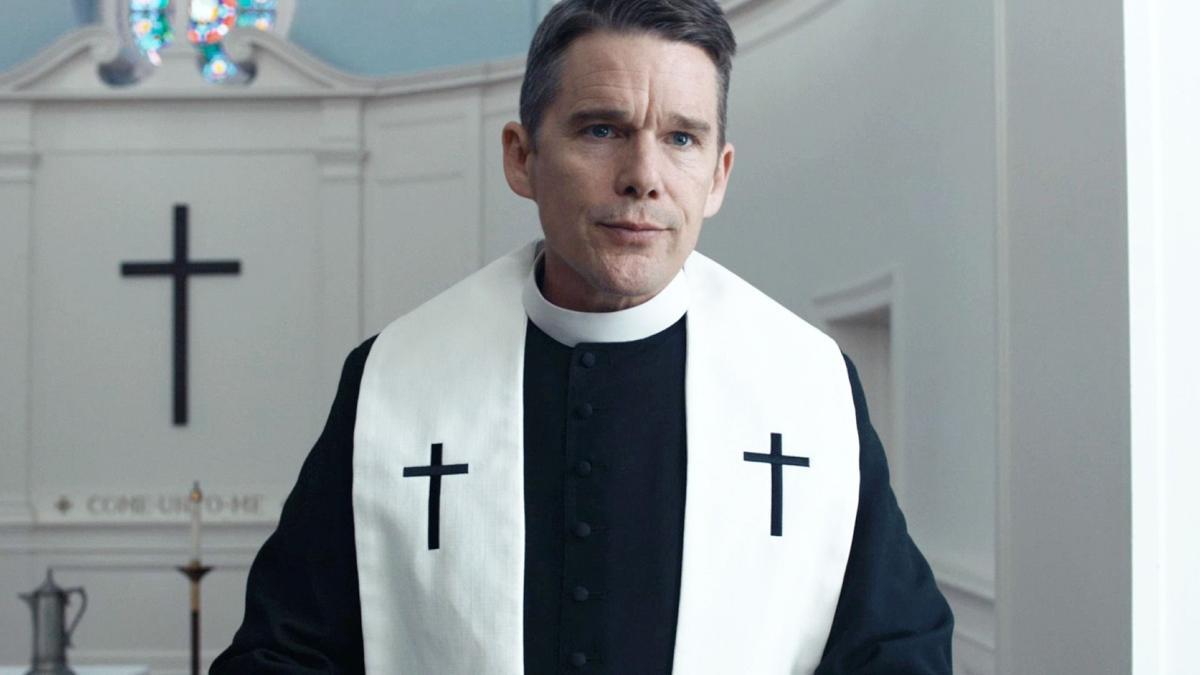
In some ways, Paul Schrader’s First Reformed is a tale of two churches. In this corner, we have the spartan, historic Dutch Reformed led by our protagonist, the sad-sack Pastor Toller (Ethan Hawke). Dutch Reformed typically has a handful of worshippers per sermon and is so cash-strapped, Toller doubles as its handyman, gardener, and plumber (he also makes extra money by giving tours of the church and selling commemorative hats and T-shirts in its gift shop). In that corner, we have the massive megachurch Abundant Life, presided over by Pastor Jeffers (Cedric “the Entertainer” Kyles), flush with cash, furnished with state of the art closed-captioning technology, and always filled to the rafters. The Abundant Life Church essentially sponsors Dutch Reformed—a kind of ecumenical version of noblesse oblige—and they’re the ones putting on the tiny church’s 250 year anniversary celebration.
Of course, Dutch Reformed is a perfect match for the ascetic Toller, who became a priest after his son died in the Gulf War and his wife left him. His sermons are quiet and erudite and a little dull. He’s having a crisis of faith, of sorts—he can no longer pray. Instead, he documents his daily thoughts, often filled with doubt and self-loathing, in a diary—one of the film’s many explicit nods to Robert Bresson’s Diary of a Country Priest. Like the priest in Bresson’s masterpiece, Toller is also ill, swigging Pepto Bismol along with the whiskey he drinks to excess.
The film’s increasingly disturbing plot is kicked off when Toller is visited by a parishioner, a distraught young wife named Mary (Amanda Seyfried). Her husband, Michael (Philip Ettinger), is a zealous environmental rights activist who is so depressed about the state of the planet, he wants Mary to abort their unborn child. Mary asks Pastor Toller to counsel her husband and he obliges.
What follows is a rather extraordinary scene in which Toller and Michael debate the morality of bringing a child into a doomed world. Toller has credibility here: Having lost a child, he can say with clarity that bringing life into the world is always better than losing it. But Michael, who keeps pictures of malnourished polar bears on tiny floes of ice on his laptop, says that it’s unfair and selfish to allow our children to inherit this world. Will God forgive us for what we’ve done to this planet?, Michael asks. And Toller doesn’t really have an answer for him. No one knows the mind of God, he notes.
As the film goes on, Toller becomes increasingly preoccupied with Michael’s concerns, and more and more attached to his beautiful pregnant wife. He’s also disgusted by the fact that giant megacorp Balq is sponsoring the 250th anniversary celebration, as they use carefully publicized acts of philanthropy to disguise the fact that they are among the country’s most corrupt polluters.
Like Travis Bickle in Scorsese’s Taxi Driver, a film that Schrader wrote, Pastor Toller keeps going to a darker and darker place. His health deteriorates, he’s cruel to the fretting Abundant Life choir director who loves him, he drinks even more, he questions his faith.
First Reformed is a slow burn of a film that gets more unsettling as it goes on. As Toller, Hawke gives the best performance of his career: restrained, dark, filled with quiet tension and despair. (As I said on Twitter, Hawke is like a Reverse Al Pacino: He gets less hammy as he gets older.) As for the 71 year old Schrader? He proves that he’s still got it. Some of the script’s moral and religious musings and symbolism might be a bit too heavy handed for some, but he counterbalances that perfectly with the film’s visual economy and restraint (that is, until the film’s last act, which I’d describe as more “holy $%#!” than restrained). Also, in a world where everyone is too hip or jaded to grapple with weighty moral issues, it’s actually nice to see a filmmaker who cares this much.
First Reformed opens Friday, June 1 at the Charles Theatre.
